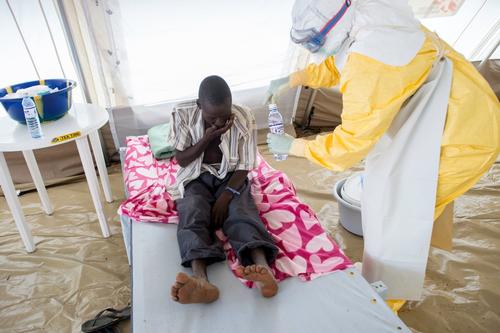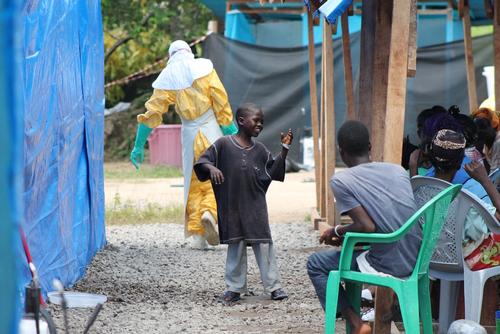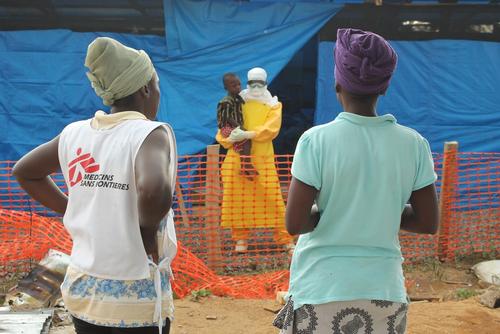First published in MSF's International Activity Report 2014, available to download below.
In 2014, the Ebola virus coursed rapidly through Liberia, Guinea and Sierra Leone in a geographical spread never seen before.
An Ebola epidemic was declared on 22 March, and it soon became the largest in history.
MSF launched an unprecedented response to this exceptional outbreak, and deployed thousands of staff who treated one-third of all confirmed cases in West Africa.
The vulnerability of healthcare workers to Ebola is a double tragedy; the virus takes the lives of the very people meant to tackle it. Nearly 500 healthcare workers have died of Ebola while thousands of others have risked their lives to support patients and help control the outbreak.
The Ebola epidemic took a heavy toll on MSF staff: 27 became infected and 13 tragically passed away in 2014.
MSF teams had never before responded to an outbreak of viral haemorrhagic fever on such a scale: the countries affected were Guinea, Liberia, Sierra Leone, Mali, Nigeria and Senegal, in addition to an unrelated Ebola outbreak in the Democratic Republic of Congo.
Despite sounding the alarm early on and calling for help, MSF teams battled Ebola for months in the face of a “global coalition of inaction”.
The virus spread wildly in the region, leading MSF to issue a rare call at the United Nations (UN) in September for the mobilisation of international civilian and military medical assets with biohazard capacity.
No one knows exactly how many people have died due to the epidemic: not only from Ebola but also from all the other diseases and ailments for which they were unable to obtain treatment due to the collapse of the health system.
By the end of the year, the number of cases in the region had begun to decline but the epidemic is still far from over. MSF teams continue to run Ebola management centres and are turning their attention to gaps in outreach activities, such as surveillance, contact tracing and social mobilisation.

Staff story
Patrick Trye – Medical Coordinator Assistant, Freetown, Sierra Leone
"I have been working with MSF since 2008, and when I felt ill in September 2014 I went straight to the staff clinic assuming I had malaria.
When I did not respond to malaria treatment after 48 hours, the medical coordinator decided that I should be taken to the case management centre (CMC) in Bo for further tests.
Within 24 hours I was told my viral status. Though it was a terrifying time, the system in place meant that there was no delay in initiating treatment before I started showing serious signs and symptoms of Ebola.
It would have been worse if I had gone through the free-toll call system (117), as it could have taken more than 48 hours for the response team to arrive.
At the CMC, I was terrified to see people dying from a disease that I had just been diagnosed with but I helped those around me for as long as I could.
Soon though my strength started to give in to the effects of the virus – vomiting, diarrhoea, sore throat and massive weakness – and I quickly realised I could no longer stand on my own.
My first instinct was to think ‘my turn to go has come, I am going to die’. I thought of my family … my committed wife who had always been by my side, my lovely children and my old mother.
I cannot over-emphasise the terrible moments I went through at the centre, but what added to my agony is the memory of a female MSF colleague who was very hopeful she would survive the illness. She explained that she had recovered from Lassa fever some years back and that she knew she would recover from Ebola too.
Unfortunately, she died two days after telling me this. It left me with a bitter taste.
For seven days my temperature remained high and at some points I refused my medication. But the clinicians at the CMC were relentless and courageous; they did not allow me to have my own way and coaxed me to comply.
I was given antibiotics for my sore throat, and when I felt very weak and dehydrated intravenous fluids and oral anti-nausea drugs. My appetite was gone and I could not eat.
Ten days after admission though, I started responding to the treatment, my throat improved and the diarrhoea and vomiting ceased. My appetite gradually returned, my body temperature normalised and I slowly regained my strength.
On 23 October, I was finally pronounced Ebola free.
After six weeks of absolute rest, I realised I had an unfinished battle. I had seen many people die in agony and I knew that my contribution to the fight against Ebola was needed now more than ever.
Complying with the medical coordinator’s advice I started work on a half-day basis. I am delighted to have resumed my normal life.”

Patient story
Benetta Coleman, 25 year old Ebola survivor
"Ebola destroyed my future. I am lonely, helpless and hopeless. But I am grateful that I still have life despite the loss, grief, helplessness and hopelessness.
I lost my son and my husband. I lost 22 other family members including my parents, siblings, nieces and nephews. I survived along with four nieces and nephews who I am now caring for.
My four-year-old niece caught the virus first and it quickly spread to the rest of the family – living in neighbouring buildings. It’s still a mystery to me how she contracted Ebola.
Before this I was a happy woman living with a happy family. But Ebola stole my happiness and rendered me homeless.
Today, I am a widow, an orphan and a grief stricken mother. I had not imagined that my life would turn out this way but this is the sad reality that I must confront. I must put the horrible past behind me.
Recovering from Ebola has not been without after effects and I continue to feel pains in my legs.
Just before Ebola struck my family, I had passed into the 12th grade. I am not sure if I will return to school, as my husband and my parents were my main sponsors. I do not have the financial means to support myself and also care for the children …
My dreams have been shattered."
For more on the Ebola intervention in 2014, see the Guinea (p.42–43), Liberia (p.58–59) and Sierra Leone (p.76–77) pages of the International Activity Report available to download below.



